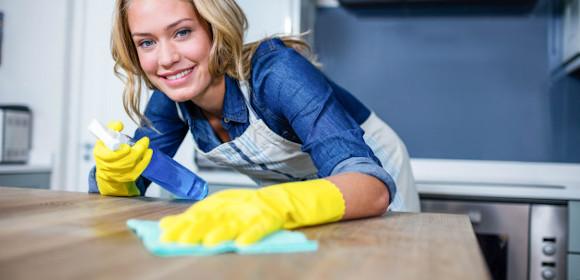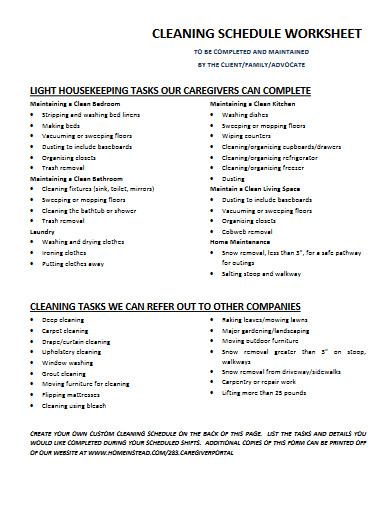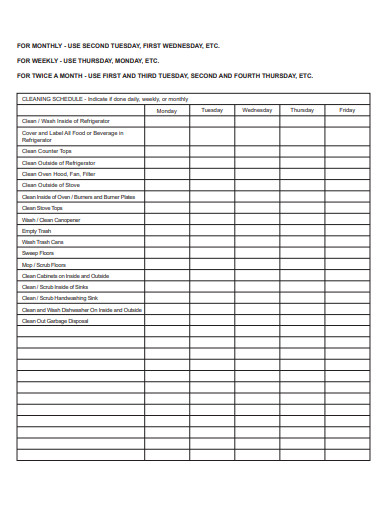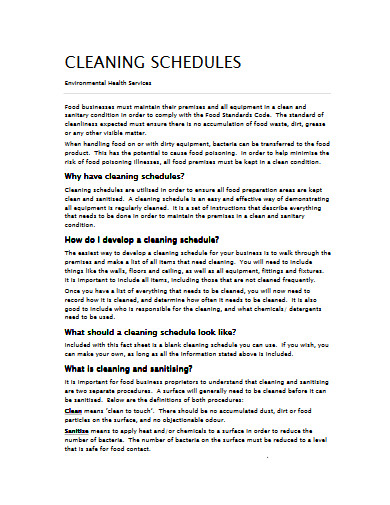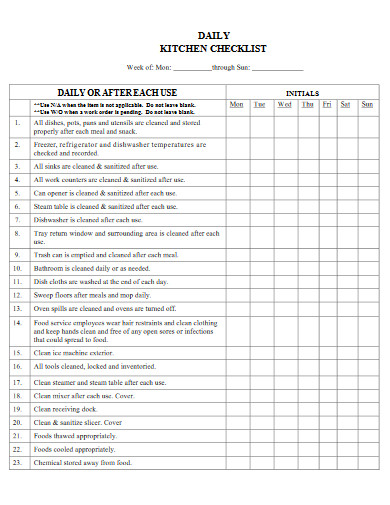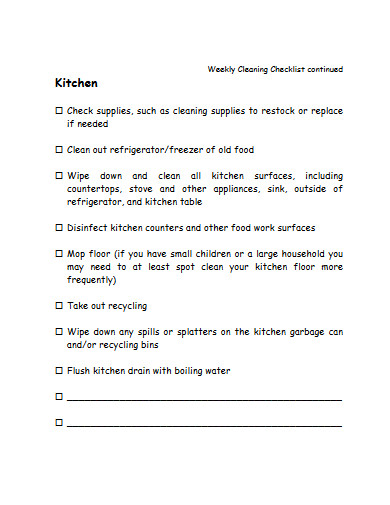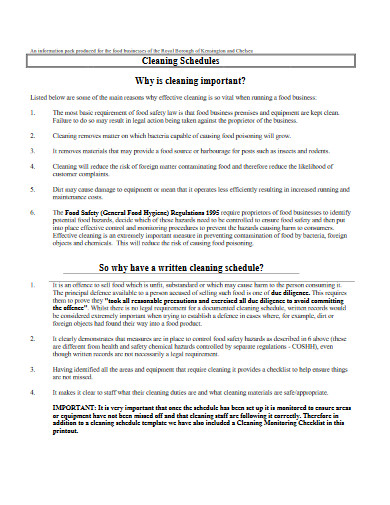10+ Kitchen Cleaning Schedule Examples to Download
Kitchens are a magical place. It sounds childish, but indeed they are, figuratively. Kitchens are where talented cooks and chefs prepare the mouthwatering dishes that we all love. As a restaurant manager, you should see your kitchen as a magical place. That’s because it’s where the magic happens in your restaurant, preparing the best delicacies that your menu offers for your customers. However, you can’t consider your commercial kitchen magical if it’s untidy and unsanitized. That’s against food safety protocols, and that can put your restaurant business in hot water. So, see to it to set up a cleaning routine for your kitchen. Our Kitchen Cleaning Schedule Examples can help you do that!
10+ Kitchen Cleaning Schedule Examples
1. Restaurant Kitchen Cleaning Schedule Template
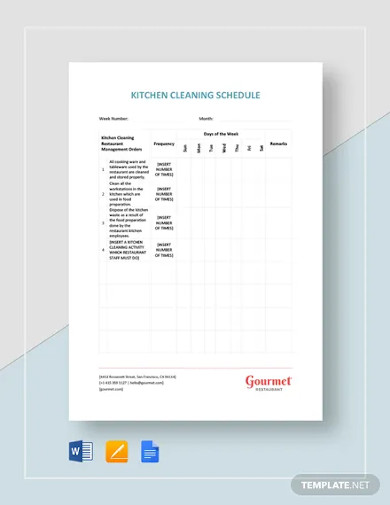
2. Free Catering Kitchen Cleaning Schedule Template
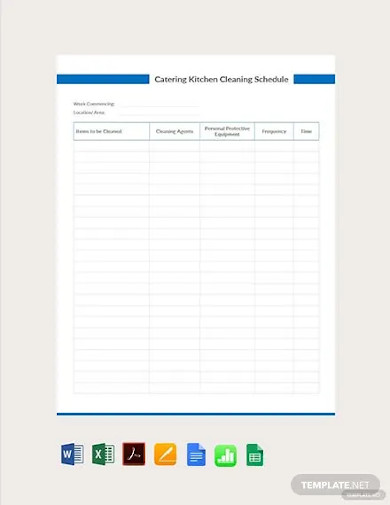
3. Free Kitchen Cleaning Schedule Template
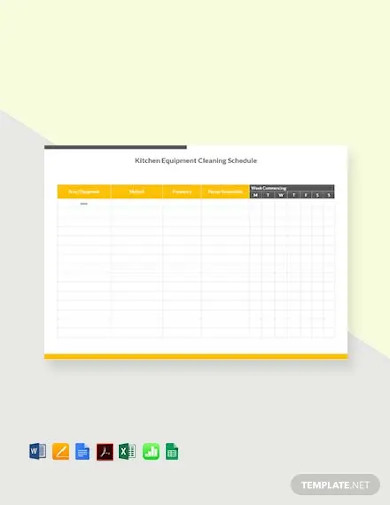
4. Free Commercial Kitchen Cleaning Schedule Template
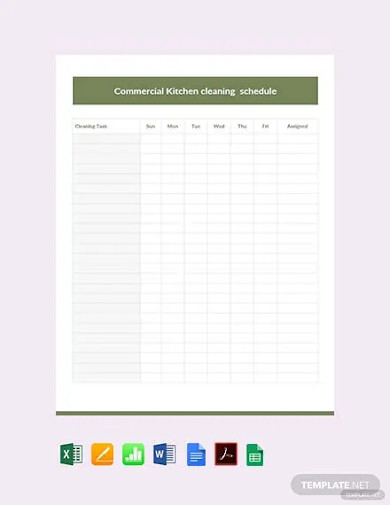
5. Free Office Kitchen Cleaning Schedule Template
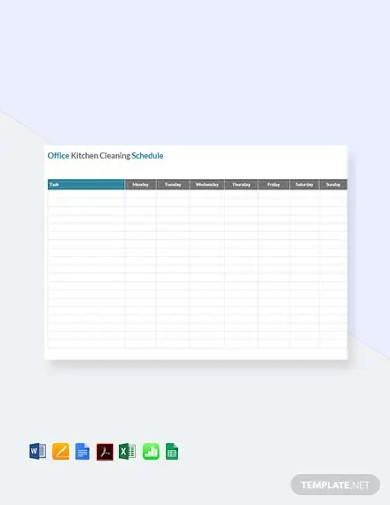
6. Kitchen Cleaning Schedule Checklist
7. Monthly Kitchen Cleaning Schedule
8. Sample Kitchen Cleaning Schedule
9. Daily Kitchen Cleaning Schedule
10. Weekly Kitchen Cleaning Schedule Checklist
11. Kitchen Cleaning Schedule Example
What Is a Kitchen Cleaning Schedule?
A kitchen cleaning schedule is a document that shows what time of the day or week a kitchen staff must clean their kitchen. It doesn’t just show what time they should clean. It also shows a cleaning checklist about what type of cleaning and sanitation they must do in each given period. As a restaurant manager, this is the schedule you need to ensure the healthy maintenance of your kitchen.
How to Deep Clean Your Kitchen
If you’re new in the restaurant business, you should know that deep cleaning kitchens is crucial. It’s a requirement that every food establishments must follow. So, here we’ll show you a kitchen deep cleaning checklist that you should add in your daily cleaning schedule.
Pre-Clean
- Wash dirty dishes
- Remove all things on the countertop and clean it
- Remove clutters that are no longer useful
Sanitize and Organize Pantry
- Double-check labels of the ingredients; toss away those that are rotten and expired
- Clear out the shelves
- Clean the empty shelves
- Return the food stocks or ingredients on the shelves. Make sure to follow the First In First Out or FIFO method in doing so
- Segregate open items
Sanitize and Organize Fridge and Freezer
- Clear out all items from the fridge and freezer
- Double-check labels; throw away rotten and expired ones
- Defrost
- Remove and clean the shelves and drawers
- Clean every surface of the fridge and freezer
- Put shelves, drawers, and food items in their proper place
- Observe FIFO
- Clean and polish the fridge and freezer’s exteriors
Clean Stove, Oven, Fryer, and Microwave
- Remove and clean all attachments, such as shelves and grates
- Remove all food residues and grease
- Clean every internal surface of the equipment spotless
- For the fryer, replace old oil with a fresh one
- Clean and polish their exteriors
- Return all the attachments
Clean the Floor
- Sweep the entire kitchen floor
- Locate areas with stains or grease
- Mop the floor
- Wash floor rugs or replace them with new ones
How to Create a Kitchen Cleaning Schedule
Creating a kitchen cleaning schedule is just like creating a house chore chart. But because it’s for your restaurant business, you need to follow these steps for it to be effective.
Step 1: Identify the Areas of the Kitchen
You can’t create a cleaning schedule without identifying the areas of your kitchen. So make sure to list them down. In doing so, you can formulate a better and organized cleaning procedure.
Step 2: Prioritize Areas with Frequent Contacts to Food
Food safety is the main purpose of imposing a kitchen cleaning chart schedule. And that’s why you must prioritize sanitizing areas that are constantly in contact with foods. Examples of these are ovens, fryers, fridges, and storage rooms. Make them a primary cleaning task in the schedule. You can do that by listing them as the schedule’s first tasks.
Step 3: Set the Schedule During Non-Peak Hours
Never set the cleaning schedule in peak hours. Your kitchen staff will be very busy in those hours due to many customers. Don’t worry, though. They will be observing the Clean As You Go or CAYGO method as they work. So instead, set the cleaning schedule in non-peak hours.
Step 4: Consult with Your Head Chef
Your head chef will be responsible for following the schedule. Plus, he or she is more knowledgeable about the kitchen operations. That said, you should consult with your head chef about the schedule. He or she might be able to add or change something in it for the better. After that, the schedule will be a part of the kitchen staff’s kitchen duties checklist.
FAQs
How often should I deep clean my kitchen?
According to the UK Commercial Cleaning Solutions, food establishments must deep clean their kitchens every six months.
Can vinegar remove grease?
Yes. The acidity of vinegar is strong enough to remove grease. But it still needs the help of soapy water.
What are the six phases of cleaning?
In general, cleaning has six basic phases, and these are:
- Pre-cleaning – removing excess waste, residues, and other unwanted particles
- Main cleaning – removing stains and softening hard dirt using soap and water
- Rinsing – removing loose or softened waste, residues, particles, and soap with water
- Disinfecting – eradicate bacteria using disinfectants
- Final rinsing – remove residues of the disinfectant
- Drying – eradicate moisture from the final rinsing
Your kitchen is among your restaurant’s main assets. It plays an important role in establishing an excellent reputation for your business. Even though your customers can’t see the state of your kitchen, it’ll reflect on the food that you serve them. So take good care of your kitchen by creating a cleaning schedule for it. For your convenience, make it using our Kitchen Cleaning Schedule Templates!


